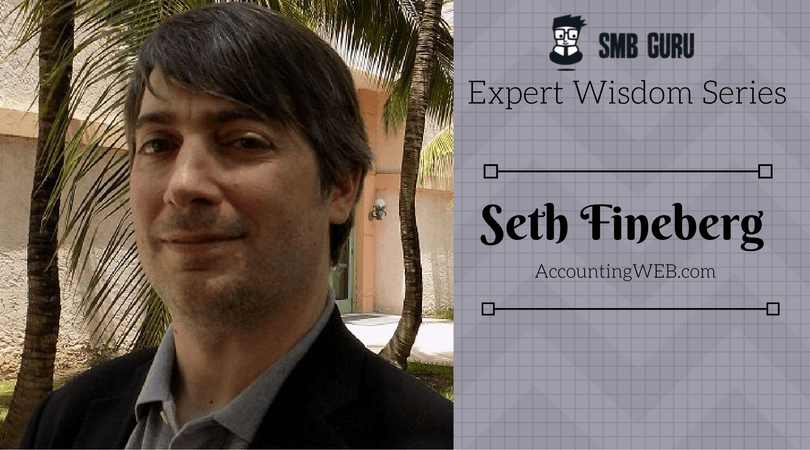Interview with Seth Fineberg
He is has been particularly vocal as regards accounting technology and the evolution of accounting, especially as related to SME. By the way, thanks Seth for being a part of this nascent SMB Blogger Wisdom endeavour! As a part of our SMB Expert Wisdom Project we contacted Seth Fineberg of AccountingWEB.com and asked him 5 questions. Seth is a business editor with 25 year background in journalism.
1. How would you define ‘small business’ in 2016?
It’s a term that gets tossed around A LOT, by service providers claiming to target them as customers or advisors wanting them as clients. Ultimately a small business is, typically, one that has very few managers, if any, one leader, and a connected staff(either in one location or using one system to work in with minimal difficulty), and a common goal. In terms of revenue, typically <$5M.
2. How do you think technology has re-shaped the SMEs (amazing and sad ways)?
I think part of my earlier response is very telling. You wouldn’t think in terms of connectivity and collaboration. Physical location, “4 walls” mean less to an SME today than what it produces and influences. The speed or pace at which they get things accomplished, and the expectations associated with that pace have been both amazing and sad, I suppose. It’s not that things are appreciated less (see items considered “crafted” or “custom”) but technology has allowed us (consumers and SMEs alike) to think and expect and work at a pace we never have.
I’m no scientist or psychologist but it could very well have an impact on our behavior and how our brains are wired. SME response time also must respond to this pace. I remember back in the mid 90s when the Internet was in a very nascent stage, I had a chance to interview Jeff Bezos (you know, of Amazon) who at the time was a very small business with one product…books for sale on the newly-formed Web. I had asked him why he thought this was a good business idea, to have an item that can be purchased by simply walking down the street in most places and make it for sale in a place people still think is a “fad” or aren’t comfortable with in the slightest. He told me, “we’re not just selling books, and we’ll be able to sell more things over time, we’re selling a concept and we’ll make a business through the level of service we provide.” Another interview I did at the time was with Seth Godin (who, true story, told he that he had received emails for Me at his own Yahoo address at the time, I had mine since about 1995 and still do). He told me that the Internet is not only going to change how business is conducted, but it will for the first time in our history, give consumers and people in general more control and that We would have more of a say in the outcome. Again, amazing and sad/scary at the same time.
3. Please give 5 notions that would define small business owners in the future.
*responsive
*Socially-aware
*connected
*agile
*virtual
4. What’s the best strategy to overcome the Digital Divide?
I hear this a lot in the accounting space, a profession that is by and large averse to change but change they must because of how business is moving. Basically the best thing is to not try to do it all at once. Stay aware of your competition and what’s going on in the app world. Google itself is a great tool to just search for what you need(key word). Assess your needs regularly and of course visit community sites and trade publications. Don’t be afraid to connect with colleagues too for suggestions, even if you see them as competition.
5. Who is your favourite blogger recently?
Oddly enough I’m not as connected to the bloggosphere as I once was, when it was a newer thing it was more prevalent in my professional life. But, as blogs go you gravitate towards what’s relevant in the space you’re in. So for now, in our space, people like Ron Baker, Daniel Susskind, Martin Bissett, and Tom Hood are saying some powerful things.

